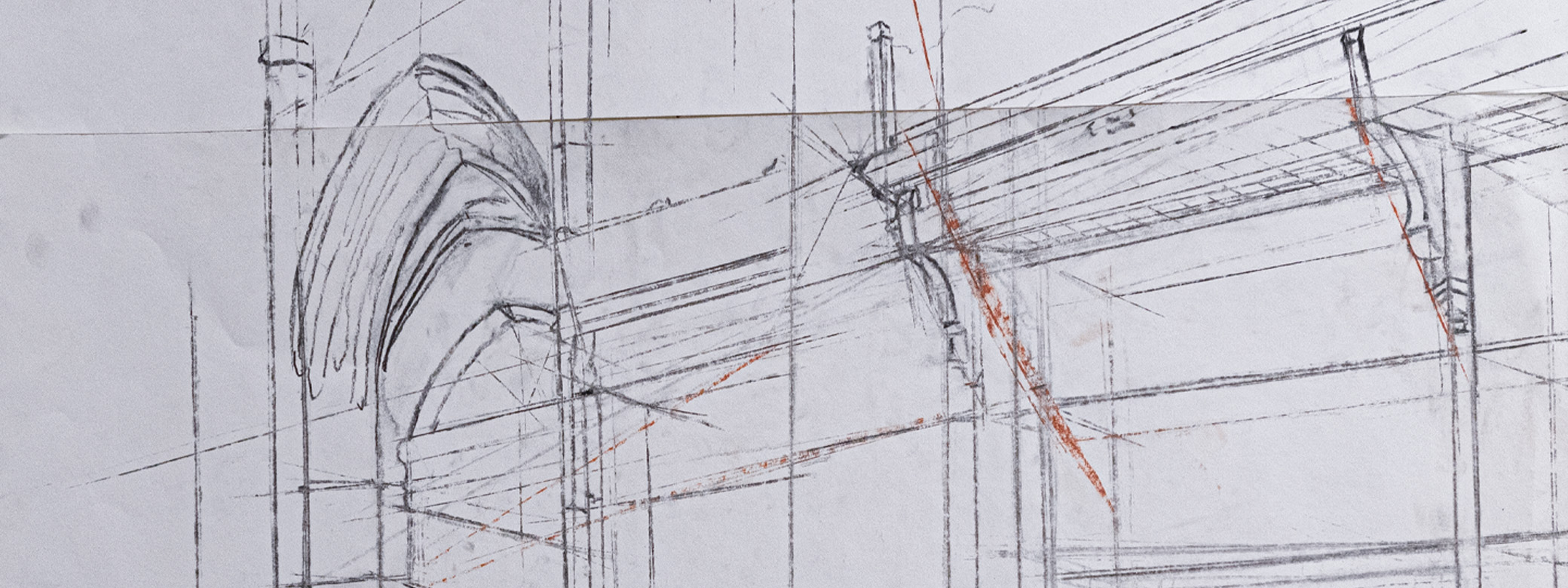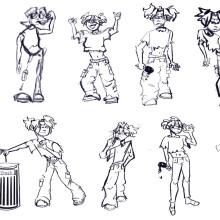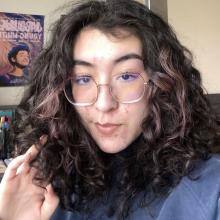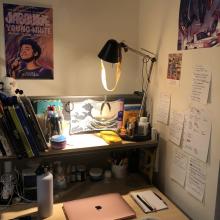Background
Katherine Munoz-Castano arrived at the University of Washington in autumn 2020 from Kent-Meridian High School in Kent, Washington. She is currently in her first year pursuing a double major in Art (with an Interdisciplinary Visual Art focus) and Cinema + Media Studies. Her goal is to work in the animation industry. She received one of the School's Crabby Beach Foundation Art Scholarships. Laura Todd, an academic adviser for the School of Art + Art History + Design, interviewed Katherine via email.
Interview
Did you always know you wanted to study art?
I wanted to be a doctor for most of my life. I was always told that I would be good at it and genuinely didn’t think to argue against it. It wasn’t until I was about 15, when I watched an animated movie in theaters with my family, that I realized people do art for a living.
What were your favorite creative activities as a child?
I enjoyed painting and drawing the most, especially when it was on surfaces I should not have been making things on. I ruined several walls and beams in my house. I painted my door at least four times over the 16 years I lived in our apartment.
Do you remember seeing a particular image or artwork that affected you?
Animated movies were a massive part of my childhood and also my introduction into American culture. One movie in particular was Dreamworks’ Spirit. Non-dialogue based cartoons, such as the Pink Panther and Looney Tunes, created a strong basis for my understanding of storytelling without relying on words. I used the expressions and body language displayed in those films to demonstrate how to talk to people without actually talking, and to create understanding. I’ve also always loved looking at Impressionist paintings. The image itself, while beautiful, never interested me as much as the particular brushstrokes that artists such as Monet used. The texture and chunkiness of the paint makes the work feel personal to me, and reminds me that a person painted this and left the paint like that because they wanted to.
What are your academic goals and/or career goals right now?
Academic goals at the moment stand at “push forward.” Taking art classes online has not quite fulfilled the idea of what I thought college art classes would be like. As much as I wishI could, I just can’t seem to make it feel like I’m attending “studio,” which, after seeing the lack of funding and space for the art department at my high school, was what I was most looking forward to in college. I just want to keep moving because I know I’m going to be able to paint in a studio if I can just be patient enough for it to come to me. It isn’t ideal, but nothing will change if I get frustrated and throw in the towel.
In terms of a career, I want to one day have the opportunity to direct an animated movie at one of the major studios on the continent. I particularly enjoy storytelling because I feel that humanity has based its entire existence on passing on stories to help us survive, and the beauty is that now we have the chance to do it in so many formats. One particular role I’d like to get into is creating storyboards for films. Storyboarding involves creating thumbnail sketches to pace out the script of the film — you use images of the characters and props to figure out what works best for the script. The collaboration that goes into creating something that feels right for the story reminds me again of what makes us human, and our desire to come together to create something.
What made you choose the UW School of Art + Art History + Design for your studies?
Initially, I would have said it was because I recognized UW and felt comfortable there. That is not to say that I think the work we are doing here is easy. I enjoy the frustration I get from trying to figure out my projects. My comfort refers to the way that the school easily fits into my life. UW is situated close to my hometown, and I get a chance to see my family often. I have access to an environment that doesn’t overwhelm me, but with enough newness that makes me want to explore. Once in my art classes, I realized that I was in an environment where I felt I was going to make my best work. You know, I was actually pretty scared considering I had originally wanted to go to school to get a degree in animation, but upon seeing that I’d get a chance to work in other areas and majors (such as cinema), I felt that I’d be getting a more well rounded education at UW. I have a chance to immerse myself in other areas of knowledge and let that new learning influence my work, which is something I’d never get to do at a school that only teaches art.
How did you feel about going into your first quarter at UW as a remote student? Is online learning better or worse than you imagined?
It’s not as bad as I imagined. My high school lacked a lot of structure and my education essentially stopped last March 2020. I was scared that might happen again as I transitioned to my college courses, because if learning online is hard I can’t imagine how hard it would be to teach online. I have definitely struggled, though. Trying to retain information from online classes often feels like I’m watching a YouTube video instead of being in class, so my focus quickly fades if I’m not careful. I have enjoyed the classes where teachers add more personal flair to their presentations and lectures in order to keep students engaged - they know how hard it is to focus right now, and they’re making a legitimate effort to make things even the slightest bit pleasant. Shoutout to Dr. Enderle from Art History 380 in particular — all of her presentations feature pictures of her with famous art pieces, and I find that to be a very entertaining way to start our lectures in her class.
Remote learning means that our ways of building community have changed. How are you finding your community as a major in the School?
It’s been difficult, mostly because I’m in a lot of intro classes, so it’s hard to find people who are in the same major as me (most classes are usually full of students trying to fulfill their VLPA credits). I have to admit the saving grace has been the opportunity to join things like class Discord groups, where we have a chance to bond and struggle through our work together. Another great thing has been the mixers and small events hosted by the School — these give us all a chance to bond.
You were awarded a Crabby Beach Scholarship for your first quarter at UW. What has this scholarship made possible for you?
The Crabby Beach Scholarship has had a profound impact on both my attendance at UW and my ability to advance my art mediums. With this support, I was able to finish paying for the rest of my year here at UW. One of my biggest goals is having the smallest amount possible of college debt so that I can finance my way into a masters’ degree without the burden of debt from my undergraduate studies. Along with that, this scholarship has allowed me to expand into new mediums that I would not have otherwise. I’ve been able to invest in digital art and begin training in the technology and programs that are required for the animation industry. Essentially, the Crabby Beach Scholarship has given me the opportunity to secure and progress my education far beyond the classroom, and I am very grateful.
Do you have any advice for students thinking about applying for scholarships?
Be yourself. I’ve seen so many people come up with gimmicks or weird “themes” for their essays, and to me that felt “presentation-y” rather than letting the scholarship committee get to know the parts of you that have rocked you to your core. This isn’t to say that you need to dump all your trauma into your essay. Don’t feel the need to expose something too personal if you don’t want to, but try to find something that is deep and meaningful that legitimately changed you. Your stats are important, yes, but they only create a profile of a student. Scholarship essays are meant to show your humanity.
Any advice for incoming first year students about the value of an arts degree?
You are legitimately going to look at things differently. The world will come undone as you slowly begin to see the application of art theories and ideas intertwined with things like architecture and engineering projects. Art isn’t just paintings in museums — it runs into every aspect of what we do as humans, what we’re drawn to create naturally. An art degree’s importance is not how it can be used for capitalist purposes, but rather how it helps us connect with people on a level that can be more understood within our own humanity.



